Daughters of the Summer Storm, Frances Statham [classic reads txt] 📗

- Author: Frances Statham
Book online «Daughters of the Summer Storm, Frances Statham [classic reads txt] 📗». Author Frances Statham
"It is of no concern to me. I will leave that up to my wife."
"And what type of mourning dresses do you wish, ma petite?" Madame Reynaud asked.
"Why, the traditional French, of course," Marigold said in a sweet, demure voice. "And we must have them by tomorrow."
The woman threw up her hands in horror. "Then I suggest we begin right away. I will send for Natalie. And you, monsieur, may call for your wife in three hours."
Crane, irritated at the woman's dismissal, hesitated. But since Marigold seemed so amenable and the room so small, he left.
When Crane returned at the designated time, several boxes were packed and ready to be taken with them, with the promise that the others would be delivered the next morning. Madame Reynaud's girls would have to stay up all night, finishing the order, but she would personally see to their delivery at the hotel the next morning.
"Bon soir, monsieur," the gray-haired woman said, "et madame." And once again, Marigold and Madame Reynaud spoke in French, further irritating Crane, who could not follow the conversation between the two women.
They had dinner in their sitting room. Afterward Crane, curious that Marigold had made no effort to remove her new clothes from the boxes, said, "I want to see what your redoubtable Madame Reynaud has selected for you."
Marigold's hands tightened on the chair in which she was sitting. "Certainly, Crane. The boxes are on the bed."
He stared at her and she stared back. She was certainly not going to model the clothes for him. Finally, he moved into the bedroom, and Marigold, still sitting in the chair, waited and listened for the tirade that was sure to come. From inside the bedroom, Crane's voice called out, "Marigold, will you please come into the bedroom? I want to hear the explanation for your obvious disobedience to me."
Sighing, she pushed herself from the chair and slowly walked toward the bed where Crane stood, holding up the white evening dress and gazing at it in distaste.
"I don't understand, Crane, what you mean by my obvious disobedience."
"The dress is white—not black, as I requested."
"Oh, but I thought that was understood. You asked me to get something suitable for mourning, and I did."
"Marigold." His voice rose in anger.
"But Crane, you were in the room when Madame Reynaud and I discussed it."
Marigold managed to look hurt as she continued. "I am half French, Crane, and so was Cousin Julie. I have chosen to mourn her in the way she would have understood."
"What does that have to do with this dress?" he demanded.
"White is the French color for mourning," she explained. "I did as you asked, Crane, and chose a wardrobe suitable for mourning." Her eyes filled with tears, and Crane, seeing her reaction, was uncertain. Had his wife deliberately done this to irk him? Or was it because of her foreign ways? He remembered he had not always understood Julie, his foster mother, either.
Seeing Marigold looking at him with such innocent, wide, tearful eyes, Crane finally said, "Well, it's too late to do anything about it. But I'm not pleased, Marigold. Somehow, I have a feeling that you deliberately misled me."
He went back into the sitting room and took up the Courier to read. And Marigold, with nothing to do, paced up and down the room like a caged cat.
"You're going to wear yourself out if you continue this nervous walking back and forth. Why don't you take a nice, relaxing bath?"
Marigold paused and glared at the man. "Not while you are in the room, Crane."
He smiled. "So modest. And yet there is not an inch of you that I would not recognize."
Marigold muffled her angry response, and Crane, pretending not to notice, turned a page of the newspaper. "I see where the widow of the late Bishop Nance is reported to have separated from her second husband. Do you know them, Marigold?"
"Yes. She is very beautiful."
"Then he must be a fool to allow her to disgrace him like this, with such notoriety in the newspaper."
Every word that Crane uttered made Marigold even more irritable. She picked at the threads of the drapery and gazed out the window.
"You might as well settle down, Marigold. We're here until tomorrow. And there is nothing you can do about it."
She continued standing at the window. Crane, still looking at the paper, said, "The new oriental drama of Mr. Hart and Mr. Young is playing tonight on Queen Street. Cataract of the Ganges. I think I'll go out to purchase tickets—and that will give my modest wife an opportunity to calm her nerves and get dressed in privacy."
"I thought we were in mourning," Marigold accused. "Surely you don't intend going to the theater. Aren't you afraid of what people will say?"
"Because of the way you have chosen to dress, no one will ever suspect that you are in mourning, Marigold. And since I prefer a pleasant evening to watching you pace back and forth, wearing out the carpet, I shall buy tickets for the performance. Besides, I'm not well known in Charleston, so I won't be censured for any impropriety."
Getting his coat, Crane remarked, "I'll send a maid with bath water, Marigold, and leave you for an hour."
She splashed the sponge over her body, not caring that the excess water dripped to the floor. She was so angry. Crane had her hands tied because of Jake. But once Jake was safe—
Marigold smiled, and in a better temper, she hurriedly finished her bath and put on the new dress. At least, Crane had not gotten the better of her in that.
It was a beautiful dress—of sheerest Indian muslin. And the shoulders were dangerously low cut. As Marigold moved before the mirror to look at the gown shimmering in the light, she remembered Shaun's disparaging look at her ruined black dress, her hair in tatters and tangles. She knew that was why she had vowed never to wear another black dress. If he could only





Comments (0)